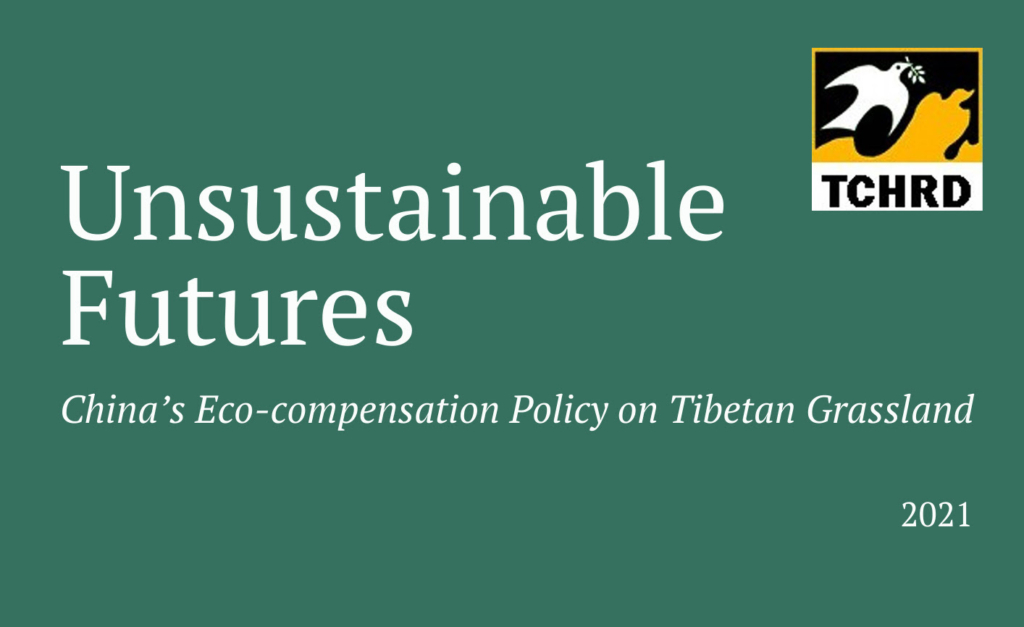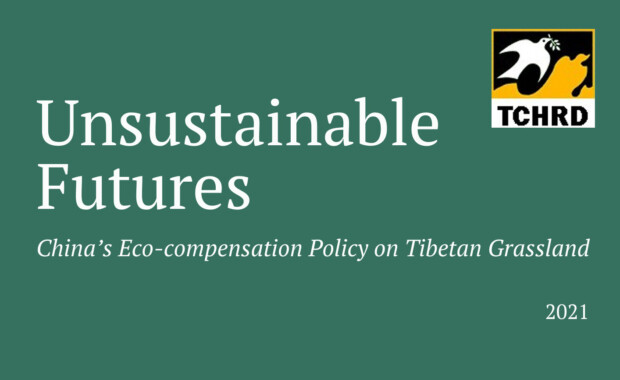New report warns of unsustainable futures for traditional land managers under China’s eco-compensation policy
 Climate change across the Tibetan Plateau greatly impacts Tibetan livelihoods, even though Tibetan customary modes of production generate very little of the emissions that cause climate change. As the world’s biggest maker and user of coal, cement, steel, aluminium, copper, and much else, China is the primary cause of climate change emissions. However, China makes great use of Tibet to mitigate its climate impact by declaring huge watersheds to be national parks, thus offsetting ongoing and still rising emissions, and repairing reputational damage.
Climate change across the Tibetan Plateau greatly impacts Tibetan livelihoods, even though Tibetan customary modes of production generate very little of the emissions that cause climate change. As the world’s biggest maker and user of coal, cement, steel, aluminium, copper, and much else, China is the primary cause of climate change emissions. However, China makes great use of Tibet to mitigate its climate impact by declaring huge watersheds to be national parks, thus offsetting ongoing and still rising emissions, and repairing reputational damage.
A new report released today by TCHRD provides evidence that using the Tibetan Plateau to offset China’s carbon footprints has not translated into eco-compensation for rural Tibetan landholders for their provisioning of ecosystem services. China distorts the concept of payment for ecosystem services by dislocating Tibetan nomadic communities, and forcibly removing them off their lands.
China’s eco-compensation policy raises questions of human rights and sustainable development, and of nature’s contribution to humanity, with global impacts and consequences. The Tibetan Plateau is close to two percent of the planet’s land surface, the size of Western Europe, and with as much global importance as other comparable geographies, perhaps more since the elevation of the Plateau has a global impact on jetstream, monsoon dynamics, and the water cycle of the entire northern hemisphere. Tibetan nature’s contribution to humanity is exceptionally big.
What China means by eco-compensation is at best vague, making little mention of local beneficiaries recompensed to stay on their lands and continue with practices conducive to biodiversity protection and delivery of ecosystem services. At worst, and commonly practiced, most transfer payments badged as eco-compensation never reach local communities, or are paid for nomads to relocate away from their lands, for their subsistence.
 Biodiversity globally is highly endangered. The world expects effective action from the Convention on Biodiversity (CBD) before it is too late. Yet China’s new system of national parks, mostly in Tibet, is not in the Tibetan areas of greatest biodiversity. The first part of the Conference of the Parties (COP) of the UN Convention on Biodiversity that convened online earlier today in Kunming (China) should prioritise defining its Target 9 for 2020 through 2030, on benefits for people through sustainable management. Indigenous and traditional local communities with long records as sustainable land managers must be the primary beneficiaries, and legally defined recipients of eco-compensation, as CBD Article 8(j) has long insisted. This is especially applicable to states which until very recently had little presence in remote landscapes such as the pasturelands of the Tibetan Plateau, and little interest in traditional knowledge, traditional management practices, and sacred land protection rituals.
Biodiversity globally is highly endangered. The world expects effective action from the Convention on Biodiversity (CBD) before it is too late. Yet China’s new system of national parks, mostly in Tibet, is not in the Tibetan areas of greatest biodiversity. The first part of the Conference of the Parties (COP) of the UN Convention on Biodiversity that convened online earlier today in Kunming (China) should prioritise defining its Target 9 for 2020 through 2030, on benefits for people through sustainable management. Indigenous and traditional local communities with long records as sustainable land managers must be the primary beneficiaries, and legally defined recipients of eco-compensation, as CBD Article 8(j) has long insisted. This is especially applicable to states which until very recently had little presence in remote landscapes such as the pasturelands of the Tibetan Plateau, and little interest in traditional knowledge, traditional management practices, and sacred land protection rituals.
Target 10 of the 2020-2030 CBD goals, ensuring areas under agriculture, aquaculture, and forestry are managed sustainably, should explicitly add fisheries and livestock including nomadic pastoralism.
Target 2 of the CBD goals to 2030 calls for the restoration of degraded ecosystems, which is most effectively achieved by keeping customary land tenure holders on their lands, employing them to sow native grasses, and re-establish ground cover. Excluding nomads and widespread poisoning of grassland rodents are mistaken policies incompatible with Target 2.
China’s policy of “orderly withdrawal” of pastoralists from Tibetan pastures is unscientific, contravenes available evidence, and should be declared a contravention of Article 8 (j) of the CBD.
China claims that its ongoing policy of displacement, exclosure, relocation, and immobilisation of rural Tibetans is in fulfilment of CBD Target 3, which calls for protecting at least 30% of land and sea areas. This can be achieved better by inclusion, not exclusion of local communities.
In September this year, at a preliminary CBD session, delegates expressed strong support for all local communities living inside protected areas to have guaranteed free, prior, and informed consent to any programs for large-scale protection of landscapes under Target 3. This should now be adopted as a binding CBD decision.
Target 21 of the CBD goals for the decade to 2030 require effective participation in decision making related to biodiversity. Tibetan pastoralists and farmers have had intimate knowledge of biodiversity endemic to their regions, yet their traditional knowledge has largely been ignored, not gathered by scientists, and routinely overlooked.
At the 26th UN climate change conference (COP26) in Glasgow to be held from 31 October – 12 November this year, the world’s core concern will be the great gap between China’s rhetoric and its actual plans to build many more coal-fired power stations. China’s ongoing, unrelenting reliance on coal-fired electricity is the main driver of China’s carbon trading scheme, which attempts to offset criticism by proclaiming emissions are offset by payments for ecosystem services that capture carbon in Tibet. The displacement of Tibetans is thus of concern to the world, which needs to know that what is labelled eco-compensation actually reduces emissions and rewards those who provide ecosystem services.
If China were to deploy the power of its authoritarian style, and directly tax polluters, there would be none of the charade of pretending to pay rural Tibetans for their provisioning of ecosystem services. The party-state’s presence is pervasive, orchestrating all of these strategies. That raises questions about Beijing’s marked preference for market-based carbon emissions trading and eco-compensation. What does market-based mean when the party-state wields its allocative powers so strongly, to pick winners, favour its favourites, dominate financialisaton and insist on active CCP involvement in management decisions, as well as directly owning nearly all the big production companies. Why, given the omnipresence of the party-state, does it not simply decree who shall reduce emissions by how much, or impose a direct tax on emitters.
source:TCHRD



comment 0